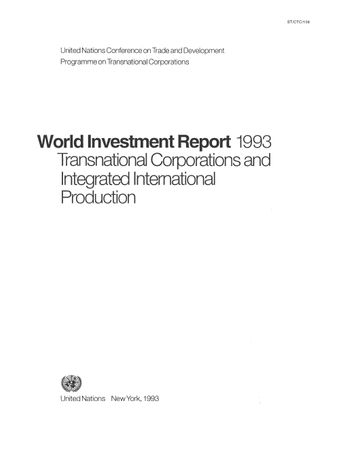- Home
- Books
- World Investment Report 1993
- Chapter
Investment policies

- Author: United Nations Conference on Trade and Development
- Main Title: World Investment Report 1993 , pp 213-227
- Publication Date: December 1993
- DOI: https://doi.org/10.18356/91ccb961-en
- Language: English
World economic interdependence today is increasingly production-based, not just trade-based as it was in the 1950s and 1960s. The change owes much to advances in transport, information and communications technology, and the liberalization of financial markets. Those advances also propelled the spread of transnational corporations (TNCs) which, in turn, have become prominent agents of integration. Today, TNCs in the largest home countries have internationalized their value-added activities and internalized the exchange of goods and services to such a degree that global sales of affiliates are considerably larger than exports in delivering goods and services to markets world-wide. In addition, the functional breakdown of the value-added chain is creating a new enterprise-level division of labour spanning national boundaries. Equally significantly, research and development is more and more carried out through intra- and interfirm technology networks on a regional or world scale (TCMD, 1992a, ch. VI). Increasingly, therefore, international economic transactions need to be seen from the perspective of foreign direct investment (FDI) (TCMD, 1992a, part III), and Governments have to adapt to this new reality. Some of the challenges for public policy were discussed in chapters VIII to X; here, the focus is on policies influencing FDI flows.
-
From This Site
/content/books/9789213626696s009-c007dcterms_title,dcterms_subject,pub_keyword-contentType:Journal -contentType:Contributor -contentType:Concept -contentType:Institution105

